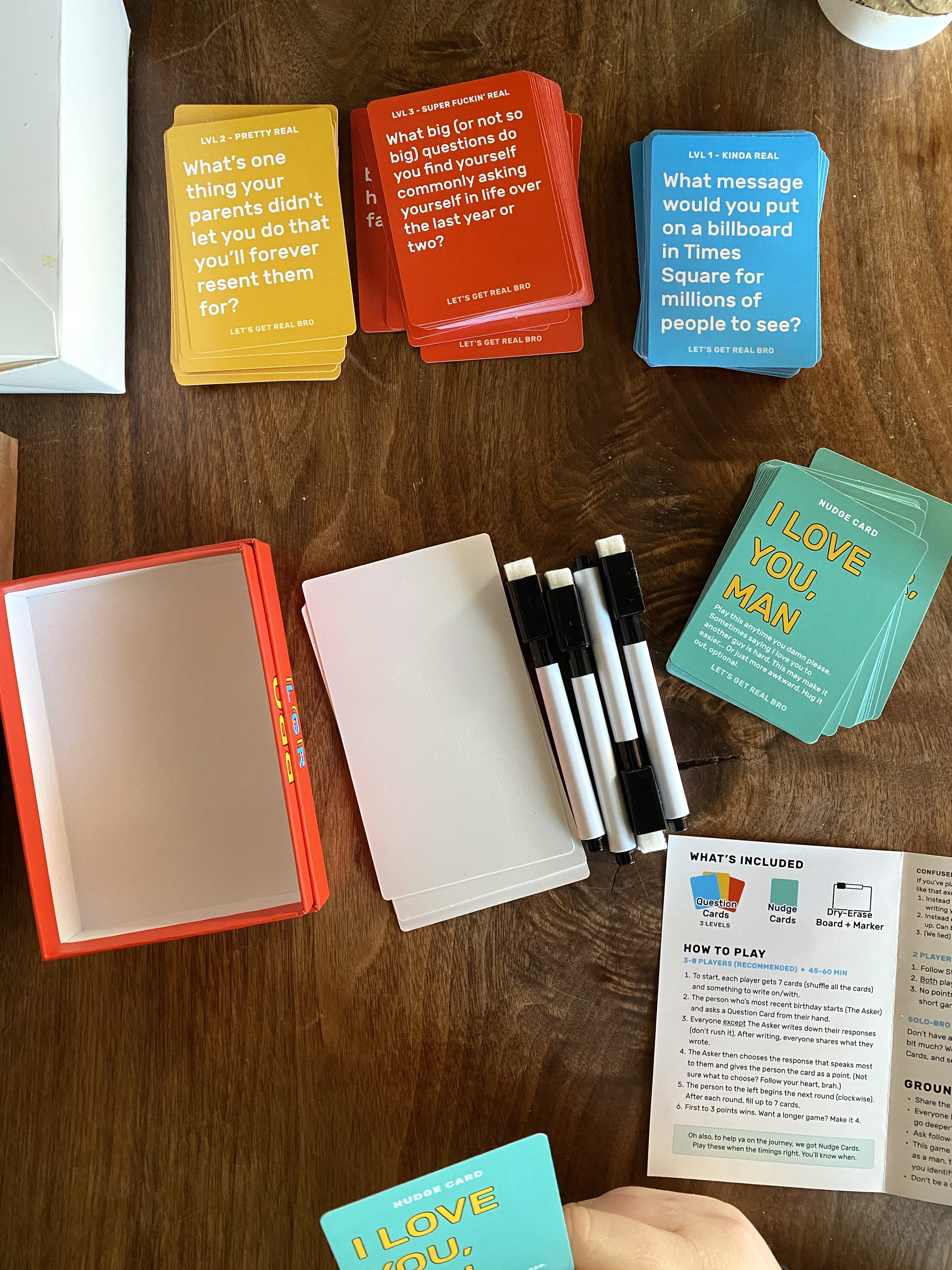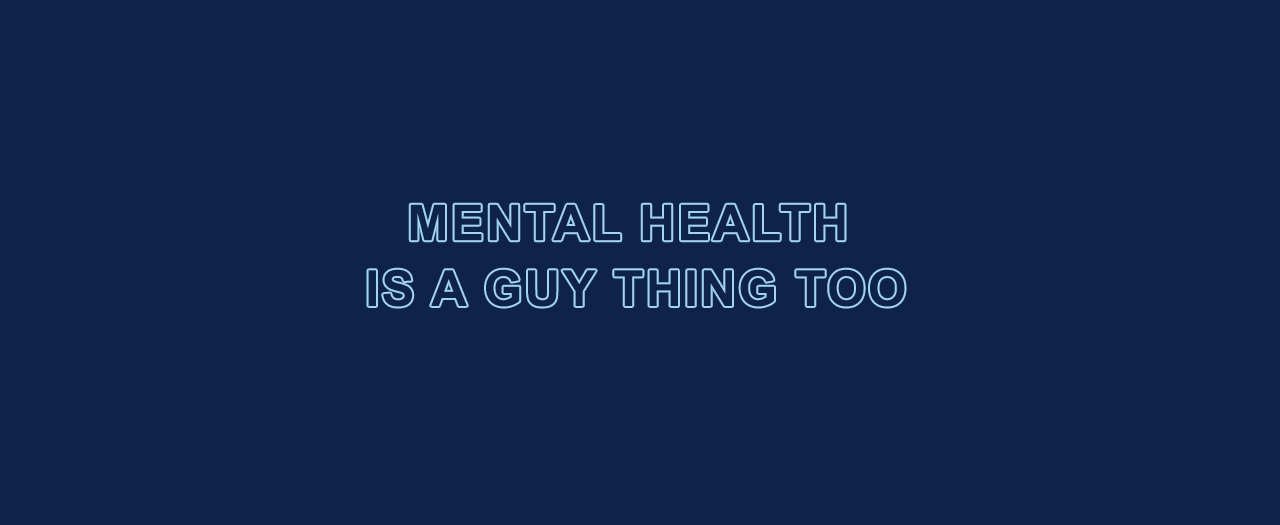Story No. 3 | Real People, Real Stories Series
This series is designed to support vulnerable male populations by sharing real-life stories of hope and resilience, with the goal of connecting 125,000 men with online tools to screen for anxiety, depression, substance and alcohol use, disordered eating, and more.
Mental health screenings are proven to help bridge the gap from disorder to treatment. If you are concerned about your mental well-being, take a free online screening >
Getting Real with Weston Karnes – The Importance of Male Connections
by Jake Donofrio
MindWise’s Jake Donofrio recently had the opportunity to interview Weston Karnes, creator of ‘Let’s Get Real Bro’ a card game designed to support men’s mental health and connection through conversation. An edited and summarized version of their conversation can be found below.
.jpeg)
Jake Donofrio: Hi Weston, so glad we were able to connect for this interview. First, let’s start with the basics. Tell me a little about yourself.
Weston Karnes: The first thing I’ll tell you is I have trouble describing myself. Can you be a little more specific?
JD: No problem. Just tell me anything you think is interesting or relevant to the story of Weston. Maybe start with your age, favorite hobbies, educational history, where you grew up, or anything else that comes to mind.
WK: I’m 34. I reside in Seattle, Washington. Newly married and newly a puppy owner. Much of my youth involved jumping from one obsession to the other, and going over to my best friend’s house every day to avoid the chaos of the family home. One of those obsessions was online poker which turned into a semi-career. I went to college with no idea what I wanted to be. Left college with no idea of what I wanted to be. Traveled Asia for a year to try to find myself. Taught myself design and moved to the Bay Area for 5 years. And now left my job as UX designer to create this brand and game.
JD: Thanks for the bio and I’m excited to hear more about your new puppy after the interview, she sounds so cute! For now, though, let’s talk about mental health. Can you tell me about your own personal journey?
WK: My journey began in ninth grade. After getting deeply embarrassed in front of my entire class a five-year period of isolation, loneliness, and social anxiety was triggered. I became obsessed with how people perceived me, and did everything in my power to hide from further shame. I made absolutely no social impact in high school, and kind of just floated through the days constantly worrying about experiencing that level of embarrassment again. I had no real tools to support myself (other than a hoodie) and all I wanted was to get out of that headspace.
JD: I’m really sorry you went through that. What happened after high school?
WK: Eventually I reached the point where I was just so alone and desperate for connection I realized that despite my fears I had to remove my hoodie and reinsert myself into the world. I wasn’t sure what all the answers to reducing my crippling anxiety were, but I knew I didn’t have them and craved finding solutions or remedies more than anything.
Travel was really helpful. I used some of my poker winnings and lived in Asia for a year. I discovered it was easier to find myself in a completely new setting, and after leaving the continent continued to travel around the world for a bit. I stumbled into meditation, soaked up any talk on psychology or art, explored therapy, and joined men’s groups-all of which really helped me understand myself and this internal world I seemingly had very little control of. But most importantly, I found friendships with other men who shared this desire to look inward and share openly about not only the good stuff, but also the less than ideal – our fears, pains and insecurities.
JD: That’s really powerful. I think more often than not, people tend to discuss the positive aspects of their lives. Why should men share their fears, pains and insecurities?
WK: Sharing those feelings validates your experiences and leads to a sense of connection with other men. It’s so important to receive support when you are struggling and too often men try and face their challenges by themselves, myself included. Sharing your emotions helps alleviate some of the loneliness you might be experiencing trying to figure everything out on your own.
JD: Part of the reason some men feel the need to hide their struggles is because of the stigma surrounding mental health. Why do you think there is a stigma, particularly among men?
WK: I believe the stigma surrounding mental health comes from the dichotomy between weakness and strength. We always want to feel strong, and sometimes it’s hard to tell whether admitting you’re struggling is a sign of weakness or strength.
I also think a lot of stigma results from people feeling rejected after expressing vulnerability. If you don’t have someone to accept you for who you are, struggles and all, that’s going to take its toll. There are just so many layers to stigma- different overlapping factors are constantly morphing into something completely new.
JD: I know what you mean, feeling rejected always takes its toll. What are some ways you believe stigma can be reduced?
WK: It’s hard to determine a way to reduce stigma because it exists in so many different forms. One of the factors contributing to the varying types of stigma is different cultures can have their own unique attitudes regarding mental health. However, athletes, musicians, and other celebrities transcend culture- I think they are key to combatting stigma. I recently went to a James Blake concert and in between songs he would stop and talk to the audience about how he’s been having a hard time managing his mental health lately. The entire arena was captivated- it was powerful. I think as more famous figures and leaders talk openly and honestly about their relationships to mental health, society as a whole will grow more comfortable having those discussions.
JD: I definitely agree with you, celebrities have such an important role when it comes to normalizing the conversation around mental health. I’d love to circle back to the men’s groups you mentioned earlier though, can you tell me a little more about those? Did members ever discuss mental health during the meetings?
WK: So, I guess that depends on what you mean by “mental health”. The men’s groups I organized with my friend were specifically designed to build internal awareness, foster emotional resilience and connect with one another on a deeper level. There are so many men that want those feelings of intimacy and understanding but just don’t know where to look
While we didn’t necessarily use the term “mental health” particularly often we focused on introspection, meditation, finding meaning and purpose, and emotional check-ins where we would “get real” about the challenges and hardships in our lives. All these topics are important aspects that fall under the mental health umbrella. Almost everyone present at these meetings was carrying emotional or traumatic baggage, yet pretty much every new member thought they would be the only one in the room who was struggling. It’s crazy how alone we can feel until we actually get together.
JD: Wow- that’s so interesting. I honestly thought the foundation of men’s groups would be cracking open a beer and catching the game, not fostering a deeper understanding of yourself and each other. Also, I’m glad you mentioned “getting real” because I’d love to talk about your new card game, “Let’s Get Real Bro”. What do you hope to accomplish with the game?
WK: “Let’s Get Real Bro” is a card game designed to help men explore, discover, and share themselves more fully. I wanted to create something that inspired connection and vulnerability between men, as I’ve found men are receptive of going to those places but they often need a little nudge, or honestly usually a big nudge. This game is meant to nudge men toward that part of themselves that is eager to form relationships and truly feel seen as their full selves.
I’ve always felt I’ve had a gift for pulling deeper parts of people out to share with me, and themselves. And I’ve always wondered, why don’t more people have that? And why do I see more women with the skills of attentive listening and questioning? Anyway, this game is my way of sharing that gift with others.

JD: I can’t wait to play the game, it seems like so much fun. When you say “let’s get real” what exactly does that mean?
WK: Funny enough, I almost never use the term “let’s get real” outside of the context of the game.
My goal is for this game to reach as many men as possible so they can support each other and form fulfilling emotional connections- “getting real” seemed to be the best way to phrase that process. If the game was called, “Let’s Embrace Our Vulnerabilities Bro” or “Let’s All Sit Down and Talk About Our Feelings Bro”, I think I would have alienated most of my target market.
Backtracking a little to your initial question though, “let’s get real” means let’s have honest conversations and who we are, where we’re at, and the what’s going on beneath the surface.
JD: While the game in its present form sounds amazing, I’m always interested in what comes next. What’s the future of “Let’s Get Real Bro”? What’s the future of Weston?
WK: Oh man, it’s so hard to say, you just never know. I definitely have grand visions for the game though. Not exactly sure what the future holds but I’d love to turn “Let’s Get Real Bro” into a larger brand and create more products of a similar nature. I’d absolutely love to host a show where I play the card game with celebrities and talk about the importance of men’s mental health and the power of understanding, accepting, and connecting with each other no matter what we may be going through. I think that would be really cool.
JD: That would be cool! And Weston, I want to thank you for taking the time out of your day to speak with me, I had a great time conducting this interview. Before we finish though, what’s the best advice you would give to someone struggling to manage their mental health?
WK: I had a great time too Jake, thank you for interviewing me. And I’d tell them, “you’re not alone”. I’d also be sure to emphasize the importance of healing through connecting, it’s just so hard and absolutely unnecessary to try and get better by yourself. No one is truly all on their own, regardless of what they may think. There’s always someone that can be there for you.
Some of the topics we cover can be difficult. For free and confidential support, call or text the Suicide & Crisis Lifeline at 988 or text the Crisis Text Line at 741741.
Want to Read More?
Check out more blog content on behavioral health, suicide prevention, and trauma-informed approaches.


